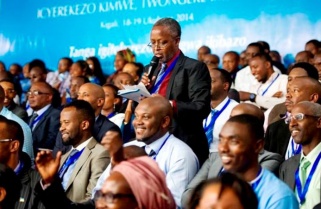 Kigali, Dec. 21.– Another year, another Umushyikirano. To a casual observer, the just completed two-day event, now traditionally held under the splendid dome of the Kigali Convention Centre, or KCC, might seem little more than a gathering of the great and the good, which concludes with the last speech, to be repeated again the following year. In reality, the two days are some of the most important in the national calendar. The true nature of Umushyikirano as a forum for policy analysis, can be clearly glimpsed in last year’s concluding presidential address.
Kigali, Dec. 21.– Another year, another Umushyikirano. To a casual observer, the just completed two-day event, now traditionally held under the splendid dome of the Kigali Convention Centre, or KCC, might seem little more than a gathering of the great and the good, which concludes with the last speech, to be repeated again the following year. In reality, the two days are some of the most important in the national calendar. The true nature of Umushyikirano as a forum for policy analysis, can be clearly glimpsed in last year’s concluding presidential address.
One could pick any year, but, last year’s was as good an illustration as any before it. It is perhaps not entirely accurate to call it a presidential address. The president, who chairs Umushyikirano, opens it with a State of the Nation address. This is delivered with the formality one would expect of such an address to the nation.
The concluding speech on the last day, however, is a speech by just another Rwandan, albeit a notable one, exercising his right to say his bit, as a part of a big national conversation. Often when addressing himself to Rwandans, President Kagame discards prepared speeches, and relaxes into conversational mode, at times more thinking aloud, than delivering a speech.
This strikes the right tone for Umushyikirano. The word is loosely translated as a National Dialogue Council, but, it holds a broader meaning. It could be described as a parliament where every citizen has a right to take part. It is one of many examples in African culture of true participatory democracy. Across the continent such examples are of course largely moribund now, but, have been revatilised in Rwanda.
At Umushyikirano, citizens can address the nation’s leadership directly. They can express their gratification, they can chide, they can suggest, above all, they speak their mind and hold the leadership to account ...
[ Full text ]
Comments powered by CComment